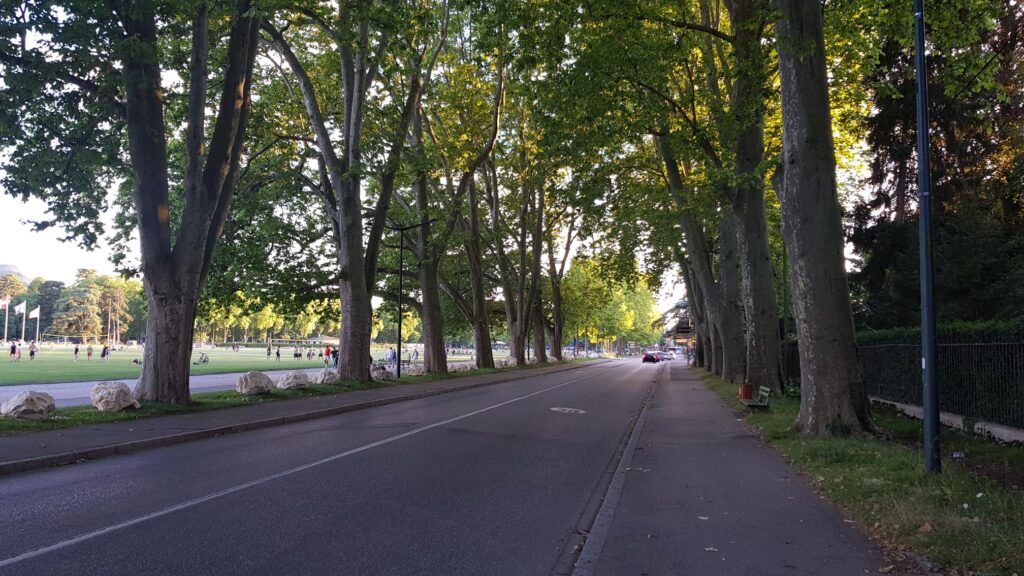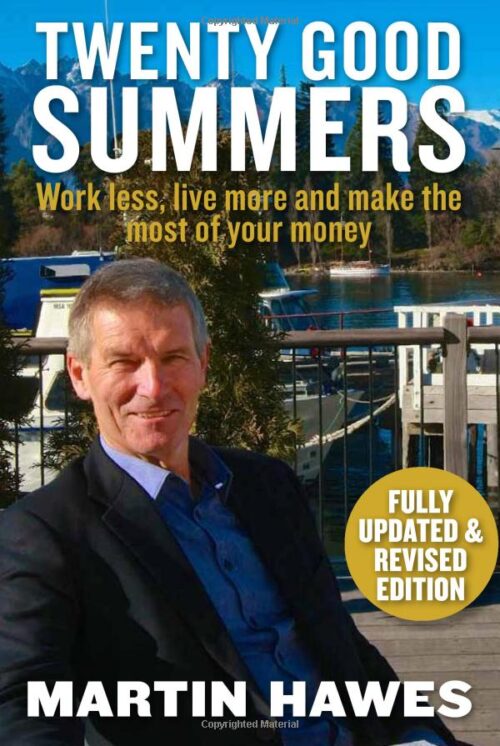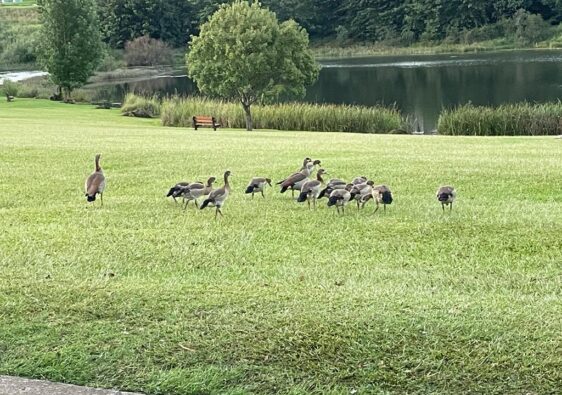So, there I was browsing the Whitcoulls Bookshop at Auckland Airport one April afternoon waiting to board a flight to Johannesburg via Sydney, when I found a little pearl of a book. I bought it and had finished it before we’d flown far enough south to see the white ice shelf of the Antarctic.
I spent the rest of the flight going back over it taking notes, running numbers and dreaming of what our Twenty Good Summers could look like.
I’d hardly gotten through the door to meet Keith after three weeks away when I said “You must read this! If we follow it we can have some awesome years while we’re still healthy enough to enjoy them!”
At a Glance
How do you determine when you are no longer required to participate in the rat race? And, how do you create the amount of money you need to support the life you want, once you decide you’re finished with swapping time for money?
When you finally reach the point when you want to simplify your life and take a step back, how will you know that you have achieved your goal? More importantly, how do you sustain your capital so you don’t diminish it on living expenses?
Light Bulb Moment
When I read the book there were a few ‘aha’ moments for me. First, I realised that no-one looks after your money like you can.
I learnt this lesson the hard way. Believe me it cost me a lot. Not only financially, but in my physical and mental health. I trusted people I shouldn’t have. I always thought that if they were a professional then they would be loyal, honourable and have sound principles. Some are, many aren’t.
Bottom line is don’t trust anyone else with your future.
So, after yet another ‘professional’ had taken years of hard work away from us without a second glance, we decided to take control of our own futures.
Taking Back Control
We learnt how to plan for the life we wanted. How to maximise our financial potential throughout what was left of our working years. Also to recognise when the moment was appropriate to make the break and re-organize our money to maintain a new, more adventurous lifestyle.
After all the money spent on advice over the years, some of the most practical and beneficial came in the form of a paperback for less than NZ$30 (at the time).
The book was titled “Twenty Good Summers” (Amazon affiliate link) and at the time I didn’t know that Martin Hawes was a best-selling financial author. To me, he merely had a title that leapt off the shelf into my hands.
Time Marches On.
Hawes commences the book by explaining that his half-century birthday served as the impetus for writing the book. This milestone birthday, celebrated by climbing a mountain (as he is wont to do) was a significant achievement. But it also served as a wake-up call for Hawes. It made him realise that time was marching on, and he still had a lot of living to do.
It prompted him to consider the possibility that he only had twenty more good summers left (hopefully more). Twenty summers to spend doing the things he enjoys most and living the life he envisions for himself.
There are lots of helpful examples in the book. They include couples who are either getting close to retiring or are planning their retirement, as well as how they go about accomplishing their goals.
In this book, Hawes also goes back over several of the concepts that were introduced in his earlier works, such as the distinction between wealth-creating assets and security assets.
Baby Boomers

Hawes concedes that, like many typical members of the generation known as the “baby boomers”, we will probably not retire in the traditional sense, as did the generation before us. But, we’ll continue to travel, make contributions to the community, and have more time to relax and enjoy what Mother Nature has to offer.
Really, it’s up to each of us to decide how we want to spend the next few years of our lives. All we need to do is reorganise and make use of the resources that we now, or can in the future, possess.
The most essential things to keep in mind are to keep our attention fixed on the life we want to live and to plan for it. Make sure your actions are taking you towards your goal and remember that it’s never too late to start. Begin planning as soon as possible.
For many couples the hardest part is sitting down and talking about what we want from this life. This is not the dress rehearsal, it’s the final night’s performance and we need to find ways to get onto the same page, so we’re pulling in the same direction.
Things never turn out exactly as planned. However, if you don’t talk about it you’ll probably be more miserable as the years go on and you realise you’ve both worked forty odd years to end up in different places.
What We Did
We managed to get a lovely winter special and headed up to the mountains for a weekend retreat.
Then:
1. We started by writing down 100 things we wanted to do, see, learn, and/or experience, before we died. We did this individually, not as a couple, and it took most of the Saturday morning.
2. We compared notes and looked at what was the same, or similar.
3. We then grouped things in terms of when it would be the ideal time to undertake the activity e.g. we’d both love to experience one cruise in our lifetime, however, we can do that when we’re older. We’d both also like to undertake some walks like the Cinque Terre. Those we brought forward as we need to be younger and fitter to do those.
Money Money Money
One of the things Hawes says in Twenty Good Summers is that your level of residual income must match the lifestyle you’re striving to create. If you fancy living in Monaco on a yacht, then you’ll need a lot more than if you fancy road tripping around doing house-sits or staying in nice cabins.
As with most things in life, everything is relative. Once you know what you want to do, then you can start running the numbers and planning accordingly.
To get started, you need to figure out how much money you need to survive on and when you want to transition from a 9-to-5 job to a life where you control your diary 24/7. After that, all that has to be done is to put this strategy into effect.
“All that has to be done” sounds so easy, but believe me, all the work you’ve done in the planning, is just the beginning!
This book is perfect for those individuals who are aiming to simplify their lives, regardless of their age.
Now really is the time to make the most of every summer!
Other Books We Found Useful
When it came to taking back control of our finances and looking at how we were going to finance and live our future, then two books by Andrew Hallam also proved very helpful.
They not only gave us useful insights into how and where to invest our money without having to spend every waking moment keeping a beady eye on the markets, but also gave us useful insights into living a less stressful life.
These 2 books are also available on Amazon.(affiliate links)
Balance: How to Invest and Spend for Happiness, Health and Wealth
Millionaire Expat: How to Build Wealth Living Overseas
Don’t let the latter title put you off. It’s well worth a read wherever you live and whatever your plans for the future are!
See where we have travelled to thus far.




